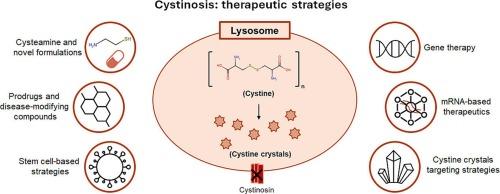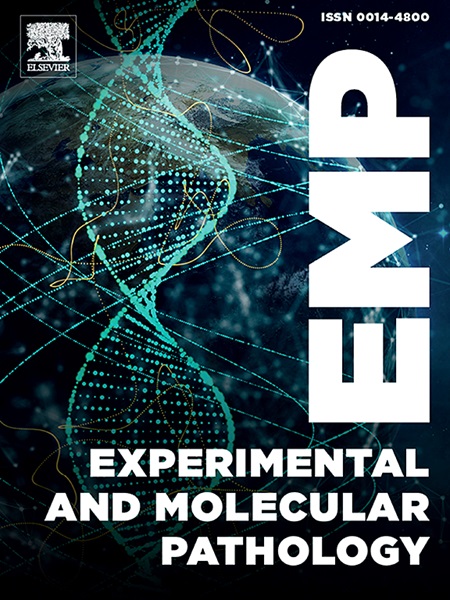Therapeutic strategies in cystinosis: A focus on cysteamine and beyond
IF 3.7
4区 医学
Q2 PATHOLOGY
引用次数: 0
Abstract
Cystinosis is a autosomal recessive lysosomal storage disorder caused by mutations in the CTNS gene, which encodes cystinosin, a cystine transporter. The defective function of cystinosin leads to cystine accumulation in the lysosome, resulting in progressive multi-organ damage. Cystinosis manifests early in life, with nephropathic cystinosis typically presenting in infancy with renal Fanconi syndrome, leading to chronic kidney disease and end-stage renal disease if untreated. Diagnosis relies on clinical evaluation, corneal examination, leukocyte cystine quantification, and CTNS genetic testing. In the present review, both cysteamine-based and non-cysteamine therapeutic approaches for the treatment of cystinosis are discussed. Cysteamine therapy, reduces intracellular cystine levels and delays disease progression, significantly improving patient outcomes. However, cysteamine requires lifelong adherence and has limitations, including gastrointestinal side effects and frequent dosing. Kidney transplantation remains a therapeutic option for end-stage renal disease, although extra-renal complications persist. Novel therapeutic strategies are under investigation to address these limitations, including improved cysteamine formulations, prodrugs, and small molecules. Additional approaches include gene therapy, stem cell-based interventions, mRNA-based treatments, and the targeted degradation of cystine crystals. Continued research and multidisciplinary management are essential to enhancing the prognosis and quality of life for individuals affected by cystinosis.

胱氨酸病的治疗策略:关注半胱胺及其他
胱氨酸病是一种常染色体隐性溶酶体贮积症,由编码胱氨酸转运体胱氨酸的CTNS基因突变引起。胱氨酸的功能缺陷导致胱氨酸在溶酶体中积累,导致进行性多器官损伤。胱氨酸病表现在生命早期,肾病型胱氨酸病通常在婴儿期与肾范可尼综合征一起出现,如果不治疗,可导致慢性肾病和终末期肾病。诊断依赖于临床评估、角膜检查、白细胞胱氨酸定量和CTNS基因检测。在本综述中,以半胱胺为基础和非半胱胺治疗胱氨酸病的方法进行了讨论。半胱胺治疗,降低细胞内半胱氨酸水平,延缓疾病进展,显著改善患者预后。然而,半胱胺需要终生坚持,并且有局限性,包括胃肠道副作用和频繁给药。肾移植仍然是终末期肾病的治疗选择,尽管肾外并发症仍然存在。新的治疗策略正在研究中,以解决这些限制,包括改进半胱胺制剂,前药和小分子。其他方法包括基因治疗、基于干细胞的干预、基于mrna的治疗和胱氨酸晶体的靶向降解。持续的研究和多学科管理对于提高胱氨酸病患者的预后和生活质量至关重要。
本文章由计算机程序翻译,如有差异,请以英文原文为准。
求助全文
约1分钟内获得全文
求助全文
来源期刊
CiteScore
8.90
自引率
0.00%
发文量
78
审稿时长
11.5 weeks
期刊介绍:
Under new editorial leadership, Experimental and Molecular Pathology presents original articles on disease processes in relation to structural and biochemical alterations in mammalian tissues and fluids and on the application of newer techniques of molecular biology to problems of pathology in humans and other animals. The journal also publishes selected interpretive synthesis reviews by bench level investigators working at the "cutting edge" of contemporary research in pathology. In addition, special thematic issues present original research reports that unravel some of Nature''s most jealously guarded secrets on the pathologic basis of disease.
Research Areas include: Stem cells; Neoangiogenesis; Molecular diagnostics; Polymerase chain reaction; In situ hybridization; DNA sequencing; Cell receptors; Carcinogenesis; Pathobiology of neoplasia; Complex infectious diseases; Transplantation; Cytokines; Flow cytomeric analysis; Inflammation; Cellular injury; Immunology and hypersensitivity; Athersclerosis.

 求助内容:
求助内容: 应助结果提醒方式:
应助结果提醒方式:


